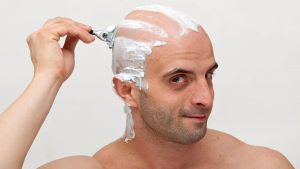
How To Shave Your Head
Want to know how to shave your head? There actually are tried and true steps that are detailed here.
The first and most important element, once you’ve made the decision to shave your head, is to know your head and I mean not just what you see in the mirror.
The contours of your head, the thickness of your hair, the texture (fineness or coarseness), whether it’s curly or straight are all factors that will affect the shave because this is definitely not one size fits all.
What may work for your best buddy will not necessarily work for you and learn why…
The Bald Truth About How To Shave Your Head
While you want to know how to shave your head don’t expect your first time in to be perfect…and that’s okay. A clue to the way your head will respond to shaving is in how your beard responds to shaving. Chances are good that you will have areas of your head that respond the same way.
Shaving in the shower may be your best bet because the feeling of water massaging your head will help relax your scalp muscles, open your pores and follicles, and soften your hair for a smoother head shave by the razor blade.
If you’re new at this, it’s better to use a razor with a high quality blade made specifically for head shaving. With the proper razor, you won’t need to worry so much about the angle or the pressure applied to your head.

Shaving Against the Grain and Other Shaving Tips
The one constant in how to shave your head for getting a clean shaved head and smooth skin is to use good quality shaving products for both preparation and post-shave care. To shave your head, remember the following:
Your head shave is best completed after a warm shower. This softens the scalp and opens the hair follicles.
Apply a good botanical shave oil, as a pre-shave will give you a moisturized prep for a pain-free shave. This is especially true for guys with sensitive skin.
Shaving after a shower will leave your hair softer and easier to cut.
Start with the lighter, finer hair and leave the coarser hair until last giving your pre-shave product more time to work.
Guys with coarse or curly hair should consider shaving with the grain because you are the ones more susceptible to ingrown hairs and razor bumps.
Guys with finer hair can shave against the grain for the closest shave. Shaving with the grain gives you the least amount of irritation.
Spare yourself some painful nicks by passing over each area of your scalp only once. Unless your razor isn’t sharp enough, this should do the trick. This will also minimize any irritation.
Remember guys (and gals) to take your time, take smooth long strokes and go slowly.

When you’re done, apply cool water to your head. The warm water before the shave opens your pores to allow moisture in. Following your shave with cold or cool water will close those pores to aid retaining the moisture.
Apply a post-shave lotion to pre-empt any skin irritation but make sure it doesn’t contain any alcohol. Alcohol will dry your skin not to mention that it will leave you with a little after burn sensation on a fresh cut.
Remember to use good quality products that assist you in providing the best shave possible. Perfection comes with experience. How to shave your head the best way is by taking the time to consistently go through the “ritual” which will in-turn guarantee you great results.



